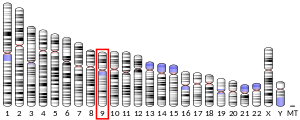Lysine-specific demethylase 4C is an enzyme that in humans is encoded by the KDM4C gene.[5][6][7]
Function
editThis gene is a member of the Jumonji domain 2 (JMJD2) family and encodes a protein with one JmjC domain, one JmjN domain, two PHD-type zinc fingers, and two Tudor domains. This nuclear protein belongs to the alpha-ketoglutarate-dependent hydroxylase superfamily. It functions as a trimethylation-specific demethylase, converting specific trimethylated histone residues to the dimethylated form. Chromosomal aberrations and increased transcriptional expression of this gene are associated with esophageal squamous cell carcinoma.[7] A expressional decrease of KDM4C was found during cardiac differentation of murine embryonic stem cells.[8]
References
edit- ^ a b c GRCh38: Ensembl release 89: ENSG00000107077 – Ensembl, May 2017
- ^ a b c GRCm38: Ensembl release 89: ENSMUSG00000028397 – Ensembl, May 2017
- ^ "Human PubMed Reference:". National Center for Biotechnology Information, U.S. National Library of Medicine.
- ^ "Mouse PubMed Reference:". National Center for Biotechnology Information, U.S. National Library of Medicine.
- ^ Nagase T, Ishikawa K, Suyama M, Kikuno R, Miyajima N, Tanaka A, Kotani H, Nomura N, Ohara O (Oct 1998). "Prediction of the coding sequences of unidentified human genes. XI. The complete sequences of 100 new cDNA clones from brain which code for large proteins in vitro". DNA Research. 5 (5): 277–86. doi:10.1093/dnares/5.5.277. PMID 9872452.
- ^ Katoh M, Katoh M (Jun 2004). "Identification and characterization of JMJD2 family genes in silico". International Journal of Oncology. 24 (6): 1623–8. doi:10.3892/ijo.25.3.759. PMID 15138608.
- ^ a b "Entrez Gene: JMJD2C jumonji domain containing 2C".
- ^ Boeckel, Jes-Niels; Derlet, Anja; Glaser, Simone F.; Luczak, Annika; Lucas, Tina; Heumüller, Andreas W.; Krüger, Marcus; Zehendner, Christoph M.; Kaluza, David (July 2016). "JMJD8 Regulates Angiogenic Sprouting and Cellular Metabolism by Interacting With Pyruvate Kinase M2 in Endothelial Cells". Arteriosclerosis, Thrombosis, and Vascular Biology. 36 (7): 1425–1433. doi:10.1161/ATVBAHA.116.307695. ISSN 1524-4636. PMID 27199445.
Further reading
edit- Yang ZQ, Imoto I, Fukuda Y, Pimkhaokham A, Shimada Y, Imamura M, Sugano S, Nakamura Y, Inazawa J (Sep 2000). "Identification of a novel gene, GASC1, within an amplicon at 9p23-24 frequently detected in esophageal cancer cell lines". Cancer Research. 60 (17): 4735–9. PMID 10987278.
- Kimura K, Wakamatsu A, Suzuki Y, Ota T, Nishikawa T, Yamashita R, Yamamoto J, Sekine M, Tsuritani K, Wakaguri H, Ishii S, Sugiyama T, Saito K, Isono Y, Irie R, Kushida N, Yoneyama T, Otsuka R, Kanda K, Yokoi T, Kondo H, Wagatsuma M, Murakawa K, Ishida S, Ishibashi T, Takahashi-Fujii A, Tanase T, Nagai K, Kikuchi H, Nakai K, Isogai T, Sugano S (Jan 2006). "Diversification of transcriptional modulation: large-scale identification and characterization of putative alternative promoters of human genes". Genome Research. 16 (1): 55–65. doi:10.1101/gr.4039406. PMC 1356129. PMID 16344560.
- Whetstine JR, Nottke A, Lan F, Huarte M, Smolikov S, Chen Z, Spooner E, Li E, Zhang G, Colaiacovo M, Shi Y (May 2006). "Reversal of histone lysine trimethylation by the JMJD2 family of histone demethylases". Cell. 125 (3): 467–81. doi:10.1016/j.cell.2006.03.028. PMID 16603238. S2CID 14461740.
- Cloos PA, Christensen J, Agger K, Maiolica A, Rappsilber J, Antal T, Hansen KH, Helin K (Jul 2006). "The putative oncogene GASC1 demethylates tri- and dimethylated lysine 9 on histone H3". Nature. 442 (7100): 307–11. Bibcode:2006Natur.442..307C. doi:10.1038/nature04837. PMID 16732293. S2CID 2874903.
- Wissmann M, Yin N, Müller JM, Greschik H, Fodor BD, Jenuwein T, Vogler C, Schneider R, Günther T, Buettner R, Metzger E, Schüle R (Mar 2007). "Cooperative demethylation by JMJD2C and LSD1 promotes androgen receptor-dependent gene expression". Nature Cell Biology. 9 (3): 347–53. doi:10.1038/ncb1546. PMID 17277772. S2CID 26006234.
- Katoh Y, Katoh M (Aug 2007). "Comparative integromics on JMJD2A, JMJD2B and JMJD2C: preferential expression of JMJD2C in undifferentiated ES cells". International Journal of Molecular Medicine. 20 (2): 269–73. doi:10.3892/ijmm.20.2.269. PMID 17611647.
- Zhao E, Ding J, Xia Y, Liu M, Ye B, Choi JH, Yan C, Dong Z, Huang S, Zha Y, Yang L, Cui H, Ding HF (2016). "KDM4C and ATF4 Cooperate in Transcriptional Control of Amino Acid Metabolism". Cell Reports. 14 (3): 506–519. doi:10.1016/j.celrep.2015.12.053. PMC 4731315. PMID 26774480.






